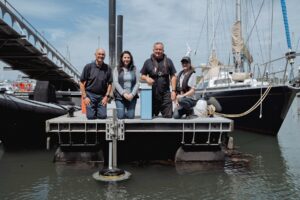
Collecteur de déchets 'Seabin' installé à Plymouth Yacht Haven

Un «Seabin» a été installé dans la marina de Plymouth Yacht Haven à Mount Batten, pour retirer les morceaux de plastique flottant de la mer.
Un Seabin aspire l'eau avant de la pomper à travers un maillage fin et de collecter les débris, plastiques et microplastiques résultants de l'eau. L'équipe de la marina de Plymouth Yacht Haven collectera les déchets du panier et les recyclera.
L'appareil, qui est fabriqué à partir de matériaux entièrement recyclés, a la capacité de contenir jusqu'à 20 kg de déchets à la fois et peut capturer plus de 1,4 tonne de débris par an.
"En travaillant et en vivant au bord de l'eau, nous constatons de première main l'impact des déchets marins et leurs effets sur la faune marine autour de Plymouth", déclare Steve Kitchen, directeur de la marina de Plymouth Yacht Haven. "Notre personnel de la marina a pris l'initiative d'introduire plus d'initiatives pour rendre notre environnement local plus propre et plus durable pour tous, du ramassage des déchets sur la plage de Mount Batten à cette nouvelle installation Seabin."
Après avoir été développé en 2016 en Australie, il y a maintenant près de 1 000 Seabins dans le monde, ce bac étant le premier situé en permanence à Plymouth.

Plymouth est le premier parc marin national du Royaume-Uni .
"En tant que résidents et entreprises, nous partageons tous la responsabilité de garder les eaux de Plymouth aussi propres et biodiversifiées que possible", déclare Kitchen. "Le Seabin a une réputation mondiale pour aider à nettoyer les océans et à protéger la faune marine, c'est donc formidable d'avoir cette installation à Plymouth Yacht Haven."
Le bac a été donné par le spécialiste du dragage basé à Plymouth, Boskalis Westminster , qui a également parrainé un Seabin au Hythe Marina Village de MDL en 2021, dans le cadre de la «binfrastructure» de la chaîne de marinas.
Les déchets marins sont un problème mondial, qui constitue une menace croissante pour la santé et la sécurité humaines. Des recherches menées par l' Université de Plymouth montrent que plus de 95 % des personnes ont déclaré avoir vu des déchets lors de leur visite sur la côte, et ces expériences étaient associées à une plus grande inquiétude et à une volonté d'adapter leur comportement personnel pour résoudre le problème.
Les membres du public sont plus susceptibles de rejeter la responsabilité de la crise mondiale des déchets marins sur les détaillants, l'industrie et le gouvernement, mais font davantage confiance aux scientifiques et aux groupes environnementaux pour développer des solutions efficaces et durables.
Plus tôt cette année, MIN a signalé que la moitié des déchets du Royaume-Uni peuvent être attribués à 10 marques , dont plus d'un tiers proviennent de sociétés de boissons.
Isobel Loxton de Boskalis Westminster déclare : « Nous convenons tous que nous espérons vivre dans un monde où des appareils comme le Seabin ne sont pas nécessaires. Les déchets ne devraient pas être dans l'océan en premier lieu. Pour l'instant, nous sommes heureux de pouvoir contribuer à réduire la quantité de plastiques dans l'eau. Mais, plus important encore, nous devons travailler avec Plymouth Yacht Haven pour utiliser le Seabin pour éduquer ceux qui vivent, travaillent et visitent les zones côtières sur l'importance de protéger nos océans.
